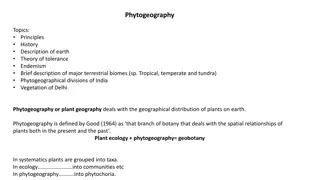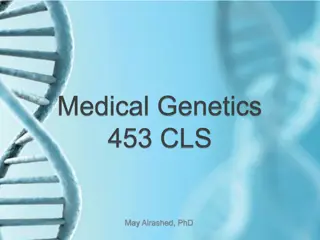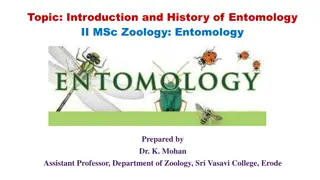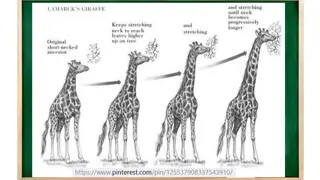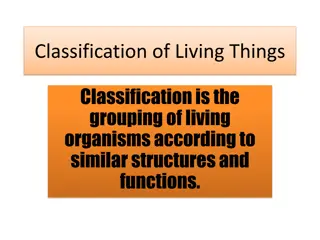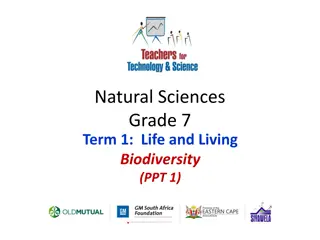Evolution and Plant Systematics Lecture Overview
This lecture outline delves into the concepts of evolution, unity, and diversity of organisms on Earth, covering topics such as fossils, Lamarck and Darwin's theories, adaptation, natural selection, artificial selection, Carolus Linnaeus' systematics, plant evolution, and the demonstration of evolut
5 views • 26 slides
Understanding Phytogeography: Geographical Distribution of Plants
Phytogeography, the branch of botany dealing with plant distribution, encompasses principles, history, major biomes, and India's divisions. It explores phytochoria, natural floristic areas based on species distribution. The study's history dates back to Theophrastus and Linnaeus, with Humboldt and H
0 views • 7 slides
Understanding Taxonomy and Scientific Classification
Explore the world of taxonomy and scientific classification, from the discipline of classifying organisms to assigning scientific names using binomial nomenclature. Learn the importance of italicizing scientific names, distinguish between species, and understand Linnaeus's system of classification.
0 views • 19 slides
Evolutionary Contributions of Prominent Scientists in the 19th Century
Charles Darwin, Gregor Mendel, Friedrich Miescher, Aristotle, and Carl Linnaeus were key figures in the 19th century who made significant contributions to the fields of evolution, genetics, DNA discovery, and taxonomy. Darwin proposed the theory of evolution and natural selection, Mendel established
0 views • 20 slides
Understanding Taxonomy and Classification Systems
Explore the world of taxonomy, classification, and binomial nomenclature through the works of Carl Linnaeus. From organizing items in closets to grouping organisms in a logical manner, discover the importance of naming and categorizing in a structured and systematic way.
0 views • 18 slides
Understanding Taxonomy and Classification in Biology
Scientists use classification to group organisms logically, making it easier to study life's diversity. Taxonomy assigns universally accepted names to organisms using binomial nomenclature. Carolus Linnaeus developed this system, organizing organisms into species, genus, family, order, class, phylum
0 views • 11 slides
Evolution of Entomology in India: A Historical Perspective
Entomology, the study of insects, has a rich history in India dating back to the 16th century. From the contributions of William Kirby to the establishment of organizations like the Bombay Natural History Society, this field has evolved significantly. Key figures such as J.G. Koenig and Professor Li
0 views • 10 slides
Pioneers in Biology: Linnaeus, Darwin, and Cell Theory
Carl Linnaeus revolutionized taxonomy by classifying numerous animals in his work Systema Naturae. Charles Darwin's evolutionary theory proposed that all species evolve from a common ancestor through natural selection. The cell theory, proposed by Schwann and Schleiden in 1838, established cells as
0 views • 12 slides
Carolus Linnaeus - Father of Modern Botany and his Classification System
Carolus Linnaeus (1707-1778) is known as the Father of Modern Botany for his significant contributions to the field. He developed a systematic way of classifying species, introducing binomial nomenclature. Linnaeus published works like Systema Naturae and Species Plantarum, where he described and cl
0 views • 10 slides
Understanding Parasitology in Veterinary Medicine by Prof. Dr. Suzan A. Al-azizz
Parasitology is a vital study of parasites and their hosts, encompassing various disciplines like cell biology, bioinformatics, genetics, and ecology. This field emphasizes the binomial system of species naming pioneered by Linnaeus. The essence of human scientific naming is exemplified by Homo sapi
0 views • 16 slides
Understanding Classification of Living Things
Explore the fascinating world of classification systems for living organisms, from early methods used by Aristotle to the modern Carolus Linnaeus system with its seven levels. Discover the helpful mnemonic "King Philip Came Over For Grape Soda" to remember the classification order and learn about bi
0 views • 8 slides
Understanding Biodiversity and Classification of Living Organisms
Explore the world of biodiversity and the classification of living organisms in Grade 7 Natural Sciences - Term 1. Learn about the five main kingdoms, Carl Linnaeus' taxonomy work, and the seven-level classification system he introduced. Discover how organisms are grouped and categorized to better s
0 views • 17 slides

